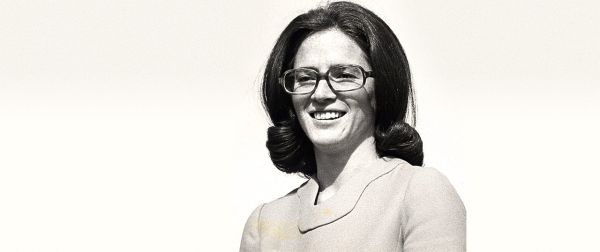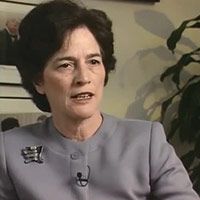Former Congresswoman Who Brought Nazis to Justice Visits Institute

When Elizabeth Holtzman of New York became the youngest woman in American history elected to Congress at age 31, she hadn’t spent much time thinking about Nazi war criminals.
But shortly after her 1973 inauguration, when a whistleblower brought to her attention the fact that such perpetrators were living in the United States with full knowledge of the federal government, the junior Congresswoman didn't let her lack of experience stop her from using the power of her office to do something about it.
Holtzman persuaded Congress to pass legislation that led to the investigation of hundreds and deportation of dozens of Nazi war criminals. She also spearheaded a successful drive to declassify the U.S. government’s Nazi War Crimes files.
On Saturday, Holtzman will come to USC Shoah Foundation to talk with the Institute’s middle- and high-school junior interns about this phase of her storied career as a Congresswoman.
Her Saturday, January 6, talk will be viewable on USC Shoah Foundation’s Facebook Live channel at 10 a.m. (PST).
Her underlying message is both simple and profound: If you see an injustice, do something.
“If you stand up, you never know when your action can make a huge difference — and set an example,” she said.
And set an example she has. Holtzman hasn’t been a mere front-row spectator to some of the nation’s most dramatic chapters, but a key participant.
During the Watergate Hearings, Holtzman was a member of the House Judiciary Committee that recommended impeachment for President Richard Nixon. During the Vietnam War, after it was revealed that the U.S. government was secretly carpet-bombing Cambodia, displacing 30 percent of the population, it was Holtzman who sued the Secretary of Defense in an attempt to make it stop. The case went to the U.S. Supreme Court, which reversed an earlier judge’s order to stop the bombings.
Before her

“What I’ve learned about people is that there are some people who do amazingly horrible things — unspeakably horrible things,” she said, and “there are people who will risk their lives to do good things.”
She remembers a Hungarian farmer who came to her office at the behest of a group of Holocaust survivors. By then, it was the early 1980s and Holtzman — well-known for her work on prosecuting Nazi perpetrators — was the District Attorney for Kings County in Brooklyn.
The man came in a rumpled suit — probably the first suit he’d ever worn — clutching a small Bible in his weather-beaten hands. He had saved 40 Jews during the war by hiding them in his home.
“When I said, ‘Thank you for the amazing courage that you showed, he looked at me and he said, ‘I just did what God told me to do,’” she said.
That story, which Holtzman writes about in her book, “Who Said It Would Be Easy?” represents the power of the idea that every individual can make a difference.
“For every horror — every Pol Pot, every Hitler, every Stalin — there are people like this farmer,” she said. “People without any real power — who do good.
“If more people did that and realized the power of good, this world would be a much better place.”